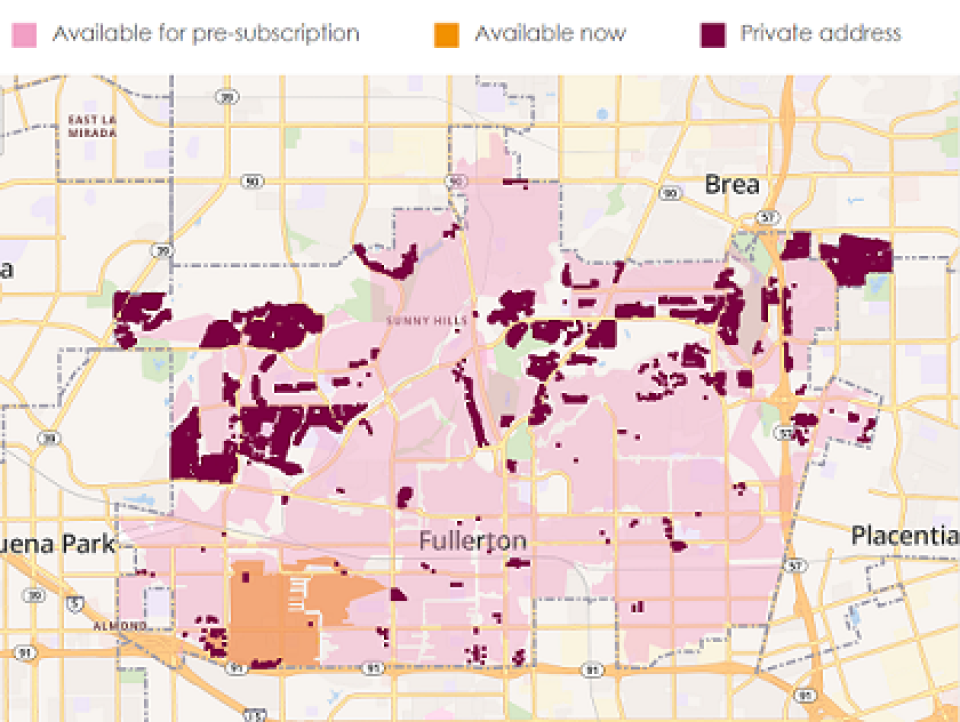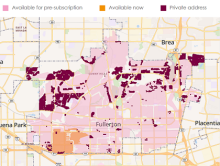
In the city of Fullerton, California (pop. 140,000), privately owned infrastructure builder and operator SiFi Networks has turned on the first section of what will be a city-wide, open access Fiber-to-the-Home network. The project makes Fullerton SiFi’s first FiberCity — a privately built, financed, and operated open access network it plans to duplicate in more cities across the country in the future. When complete next fall, the Fullerton FiberCity network will pass every home and business in the city, with the company's subsidiary, SiFi Networks Operations, selling wholesaling capacity to as many Internet Service Providers (ISPs) as want to enter the market.
A Different Approach

SiFi’s FiberCity model remains somewhat unique in the United States, and is much more common in Europe and Asia. CEO Ben Bawtree-Johnson attributes their success to cracking the economic code for private investment in open access information infrastructure, which has seen more attention in recent years as investors and fund managers have seen opportunities. “[O]ur vision really is to create as many last-mile fiber optic networks as we can across the USA in a long term sustainable fashion,” Bawtree-Jobson remarked on an episode of the podcast last fall. “[W]e're all about long term, dry, low yielding, risk mitigated investments, so everything we do is based around 30-year plus type investments.”
Fullerton, according to SiFi, was an ideal candidate for its first FiberCity because it applied to be one of the original candidates (though not chosen) for a Google’s fiber program, begun in 2010. The company sees it as sitting in the Goldilocks’ zone in terms of size and population. Construction started last November, and currently consists of around 600 miles of fiber all underground via microtrenching. Nokia serves as the main equipment partner on the project.
Turning on the Lights
The first residential customers were hooked up in June, with an anticipated completion date in the fall of 2021. SiFi Fullerton provides gigabit-capable services for ISPs to offer residential and commercial triple-play service, but also the infrastructure for smart city deployments and to connect government buildings with other community anchor institutions. Because it’s a privately financed and run project, we also don’t know how many people are connected to it or its current take rate in the launch area.

Ting and GigabitNow serve as ISPs in Fullerton currently (though more could join them), with GigabitNow offering residents symmetrical 250 Megabit per second (Mbps) and gigabit tiers for $60/month and $79/month, respectively. Wi-Fi 6 routers cost an extra $11/month to rent. Ting prices are the same, sans the router.
An obvious advantage of open access networks like these is that customers can switch on the fly with no hardware changes. The service provider handles everything on their end. By removing barriers to switching, the effect is to promote competition, lowering prices and increasing speeds and services. But there are also other innovation benefits when infrastructure and service are separated.
Another advantage with ubiquitous builds is that they solve one of the two problems which have created the digital divide in America — by hitting every home in the city. Everyone in Fullerton will eventually have fiber access, unlike in other places where huge ISPs like AT&T have cherry-picked the neighborhoods where they see the most disposable income and profit and directed their investments accordingly. SiFi holds digital equity and inclusion efforts at the core of its mission, which contribute to its commitment to builds which serve every single premises in project cities. Subscription price serves as the second major barrier to most families, and even though SiFi’s restricts its business to building and operating the infrastructure, according to Bawtree-Jobson the company is working with ISPs in Fullerton and in future FiberCity locations to deploy a subsidized tier for low-income residents.
Lessons Learned
There were certainly growing pains in getting the project going, Bawtree-Jobson related in an interview, citing the importance of working with the city to conform to local permitting requirements and making sure city expectations are also in line with projects like this among all stakeholders.
Fullerton has not seen much of an incumbent response yet, according to the company, which it attributes to city being a relatively small market in a large metro territory. AT&T also operates fiber in the area, offering gigabit download and upload speeds for $50/month for one year, which then increases (at current prices) to $60/month.
SiFi sees more of these type of projects in the next couple of years, especially as private capital markets wake up to opportunities for investment. With all of the broadband projects funded by the CARES Act we’ve been seeing, the additional ones which will be set off by Federal Communication Commission’s upcoming Rural Digital Opportunity Fund auction this fall, and privately financed ones like SiFi’s, those communities looking to move the needle on broadband projects which have already began to get their ducks in a row will be better positioned as the labor market for skilled information infrastructure workers struggles to meet upcoming demand.
A handful of additional cities are on tap for SiFi, including four more in California as well as East Hartford, Connecticut; Salem, Massachusetts; and Saratoga Springs, New York.
Hear more from Ben Bawtree-Jobson on the private financing model in this year’s Broadband Communities Summit next week, where he’ll talk about infrastructure investment funds from 1:40 p.m.-2:50 p.m. on Tuesday, Septemeber 22. This, conveniently enough, will provide you time to first watch Christopher Mitchell moderate a panel on last-mile infrastructure from 11:20 a.m.-1:20 p.m.
Listen to the history of SiFi Networks and their approach on Episode 360 of the Community Broadband Bits Podcast, below.
Featured image by Wikimedia Commons user Geographer, used under a Creative Commons CCY by 2.5Dedication.
Correction: An earlier version of this story said that AT&T fiber connections had a 1TB monthly data cap. The company removed this cap earlier this year.









